| Listing 1 - 10 of 53 | << page >> |
Sort by
|
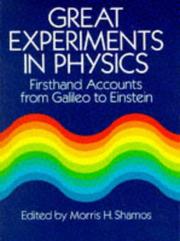
ISBN: 0486253465 9780486253466 Year: 1959 Publisher: New York: Dover,
Abstract | Keywords | Export | Availability | Bookmark
 Loading...
Loading...Choose an application
- Reference Manager
- EndNote
- RefWorks (Direct export to RefWorks)
Physics --- History --- History. --- Physics - History
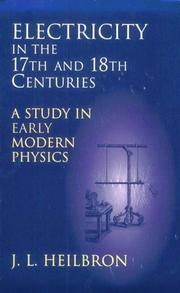
ISBN: 0486406881 9780486406886 Year: 1999 Publisher: Mineola, N.Y.: Dover,
Abstract | Keywords | Export | Availability | Bookmark
 Loading...
Loading...Choose an application
- Reference Manager
- EndNote
- RefWorks (Direct export to RefWorks)
Electricity --- Physics --- History. --- History --- Electricity - History --- Physics - History
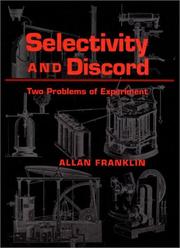
ISBN: 0822961946 9780822941910 9780822961949 0822941910 Year: 2002 Publisher: Pittsburgh, Pa.: University of Pittsburgh Press,
Abstract | Keywords | Export | Availability | Bookmark
 Loading...
Loading...Choose an application
- Reference Manager
- EndNote
- RefWorks (Direct export to RefWorks)
Selectivity and Discord addresses the fundamental question of whether there are grounds for belief in experimental results. Specifically, Allan Franklin is concerned with two problems in the use of experimental results in science: selectivity of data or analysis procedures and the resolution of discordant results. By means of detailed case studies of episodes from the history of modern physics, Franklin shows how these problems can be--and are--solved in the normal practice of science and, therefore, that experimental results may be legitimately used as a basis for scientific knowledge.
Science - Philosophy --- Physics - Experiments --- Physics - History --- Science --- Physics
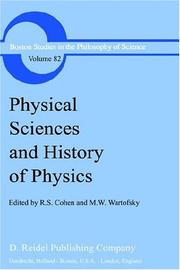
ISBN: 9027716153 940097180X 9400971788 9789027716156 Year: 1984 Volume: 82 Publisher: Dordrecht: Reidel,
Abstract | Keywords | Export | Availability | Bookmark
 Loading...
Loading...Choose an application
- Reference Manager
- EndNote
- RefWorks (Direct export to RefWorks)
Physics --- History --- -Natural philosophy --- Philosophy, Natural --- Physical sciences --- Dynamics --- History. --- -History --- Natural philosophy --- Physics - History
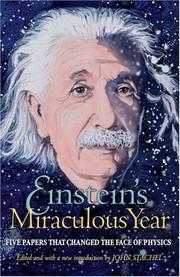
ISBN: 0691059381 9780691059389 Year: 1998 Publisher: Princeton (N.J.): Princeton university press,
Abstract | Keywords | Export | Availability | Bookmark
 Loading...
Loading...Choose an application
- Reference Manager
- EndNote
- RefWorks (Direct export to RefWorks)
Physics --- Physique --- History --- Histoire --- Einstein, Albert, --- Physics - History - 20th century --- Einstein, Albert, - 1879-1955
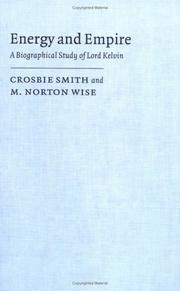
ISBN: 0521261732 9780521261739 9780521129213 9780521129251 9780521129282 0521129214 0521129281 0521129257 Year: 1989 Publisher: Cambridge [Cambridgeshire]: Cambridge university press,
Abstract | Keywords | Export | Availability | Bookmark
 Loading...
Loading...Choose an application
- Reference Manager
- EndNote
- RefWorks (Direct export to RefWorks)
This study of Lord Kelvin, the most famous mathematical physicist of 19th-century Britain, delivers on a speculation long entertained by historians of science that Victorian physics expressed in its very content the industrial society that produced it.
Physicists --- Physics --- Biography. --- History. --- History --- Great Britain --- Biography --- Kelvin, William Thomson, Baron, 1824-1907. --- Physics - History. --- Physicists - Great Britain - Biography. --- Kelvin, William Thomson, --- Physics - History --- Physicists - Great Britain - Biography --- Kelvin, William Thomson, - Baron, - 1824-1907

ISBN: 0521816009 0521140021 1107144787 1139855026 1139855395 1139855301 1139814044 1139855212 113964422X 1139855115 1299405770 9780521816007 9781139644228 9780521140027 Year: 2006 Publisher: Cambridge: Cambridge university press,
Abstract | Keywords | Export | Availability | Bookmark
 Loading...
Loading...Choose an application
- Reference Manager
- EndNote
- RefWorks (Direct export to RefWorks)
Underpinning all the other branches of science, physics affects the way we live our lives, and ultimately how life itself functions. Recent scientific advances have led to dramatic reassessment of our understanding of the world around us, and made a significant impact on our lifestyle. In this book, leading international experts, including Nobel prize winners, explore the frontiers of modern physics, from the particles inside an atom to the stars that make up a galaxy, from nano-engineering and brain research to high-speed data networks. Revealing how physics plays a vital role in what we see around us, this book will fascinate scientists of all disciplines, and anyone wanting to know more about the world of physics today.
Physics --- Quantum theory --- History --- 53 --- Quantum theory. --- 53 Physics --- Quantum dynamics --- Quantum mechanics --- Quantum physics --- Mechanics --- Thermodynamics --- Natural philosophy --- Philosophy, Natural --- Physical sciences --- Dynamics --- Physics - History - 20th century --- Physics - History - 21st century --- Acqui 2006

ISBN: 0691012067 9780691012063 0691095523 0691214190 Year: 1999 Publisher: Princeton (N.J.): Princeton university press,
Abstract | Keywords | Export | Availability | Bookmark
 Loading...
Loading...Choose an application
- Reference Manager
- EndNote
- RefWorks (Direct export to RefWorks)
At the end of the nineteenth century, some physicists believed that the basic principles underlying their subject were already known, and that physics in the future would only consist of filling in the details. They could hardly have been more wrong. The past century has seen the rise of quantum mechanics, relativity, cosmology, particle physics, and solid-state physics, among other fields. These subjects have fundamentally changed our understanding of space, time, and matter. They have also transformed daily life, inspiring a technological revolution that has included the development of radio, television, lasers, nuclear power, and computers. In 'Quantum Generations', Helge Kragh, one of the world's leading historians of physics, presents a sweeping account of these extraordinary achievements of the past one hundred years.The first comprehensive one-volume history of twentieth-century physics, the book takes us from the discovery of X rays in the mid-1890s to superstring theory in the 1990s. Unlike most previous histories of physics, written either from a scientific perspective or from a social and institutional perspective, 'Quantum Generations' combines both approaches. Kragh writes about pure science with the expertise of a trained physicist, while keeping the content accessible to nonspecialists and paying careful attention to practical uses of science, ranging from compact disks to bombs. As a historian, Kragh skillfully outlines the social and economic contexts that have shaped the field in the twentieth century. He writes, for example, about the impact of the two world wars, the fate of physics under Hitler, Mussolini, and Stalin, the role of military research, the emerging leadership of the United States, and the backlash against science that began in the 1960s. He also shows how the revolutionary discoveries of scientists ranging from Einstein, Planck, and Bohr to Stephen Hawking have been built on the great traditions of earlier centuries.Combining a m
History of physics --- Physics --- Physique --- History --- Histoire --- -Natural philosophy --- Philosophy, Natural --- Physical sciences --- Dynamics --- -Physics --- -History --- Physics - History - 20th century.
Book
ISBN: 9780521535427 9780521828345 0521828341 0521535425 9781139024525 Year: 2014 Publisher: New York (N.Y.): Cambridge university press,
Abstract | Keywords | Export | Availability | Bookmark
 Loading...
Loading...Choose an application
- Reference Manager
- EndNote
- RefWorks (Direct export to RefWorks)
This volume is the first systematic presentation of the work of Albert Einstein, comprising fourteen essays by leading historians and philosophers of science that introduce readers to his work. Following an introduction that places Einstein's work in the context of his life and times, the book opens with essays on the papers of Einstein's 'miracle year', 1905, covering Brownian motion, light quanta, and special relativity, as well as his contributions to early quantum theory and the opposition to his light quantum hypothesis. Further essays relate Einstein's path to the general theory of relativity (1915) and the beginnings of two fields it spawned, relativistic cosmology and gravitational waves. Essays on Einstein's later years examine his unified field theory program and his critique of quantum mechanics. The closing essays explore the relation between Einstein's work and twentieth-century philosophy, as well as his political writings.
Einstein, Albert --- Physics --- History --- Einstein, Albert, --- Physicists --- Biography --- Physicists - Biography --- Physics - History - 20th century --- Einstein, Albert, - 1879-1955
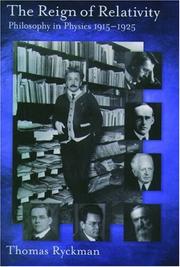
ISBN: 0195177177 9780195177176 0199835322 0195320182 9786611197070 1281197076 0198039379 1423761898 Year: 2005 Volume: *1 Publisher: Oxford: Oxford university press,
Abstract | Keywords | Export | Availability | Bookmark
 Loading...
Loading...Choose an application
- Reference Manager
- EndNote
- RefWorks (Direct export to RefWorks)
Philosophy of science --- anno 1900-1999 --- Relativiteit (Natuurkunde) --- Relativity (Physics) --- Relativité (Physique) --- History. --- History --- Relativity (Physics) - History.
| Listing 1 - 10 of 53 | << page >> |
Sort by
|

 Search
Search Feedback
Feedback About UniCat
About UniCat  Help
Help News
News